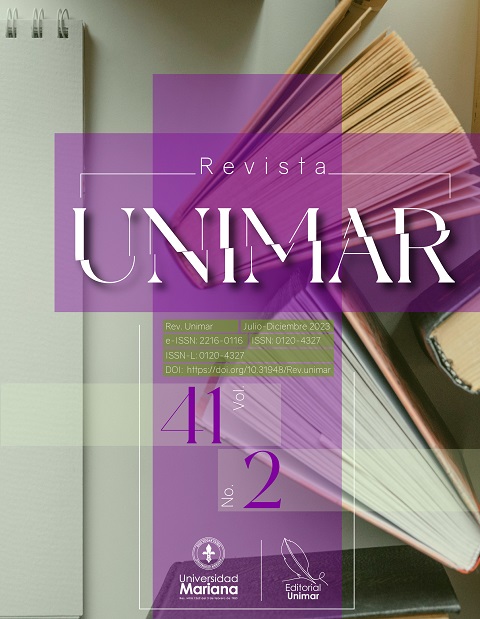Centro literario para el fortalecimiento del aprendizaje de la literatura colombiana contemporánea
DOI:
https://doi.org/10.31948/Rev.unimar/unimar41-2-art3Palabras clave:
centro literario, aprendizaje, literatura contemporáneaResumen
El objetivo del presente estudio fue proponer un centro de interés literario como método lúdico para el fortalecimiento del aprendizaje significativo de la literatura colombiana contemporánea en los estudiantes del grado 8-A de la I.E Agropecuario Rosa Jaimes Barrera. Metodológicamente, el estudio se ubicó en el paradigma pospositivista, desde un enfoque cualitativo, enmarcado en la investigación acción participativa; considerando las siguientes fases: deconstrucción, reconstrucción y evaluación de la práctica. La unidad de análisis la constituyó 38 discentes del grado 8-A. Para la recolección de datos, se utilizó la encuesta y la observación (técnicas), y el cuestionario, la bitácora y la rúbrica (instrumentos). Entre los resultados, se resalta que las actividades lúdicas permitieron a los estudiantes percatarse de la relevancia del aprendizaje literario para afianzar la expresión lingüística. Se concluye que, las obras literarias, el diseño de actividades lúdicas colaborativas y participativas fortalecieron el aprendizaje significativo en los estudiantes.
Biografía del autor/a
Karen Patricia Watts Rodríguez, Institución Educativa Agropecuaria Rosa Jaimes Barrera
Master’s student in Pedagogy, Universidad Mariana; Bachelor’s degree in Educación Básica, Humanidades, Lengua Castellana e Inglés, Corporación Universitaria del Caribe (CECAR). Teacher at Institución Educativa Agropecuaria Rosa Jaimes Barrera
Mireya Castellanos León, Institución Educativa Agropecuaria Rosa Jaimes Barrera
Master’s student in Pedagogy, Universidad Mariana; Specialist in Lúdica Educativa, Universidad Juan de Castellanos; Bachelor’s degree in Ciencias Fisicomatemáticas, Universidad del Magdalena. Teacher at Institución Educativa Agropecuaria Rosa Jaimes Barrera.
Referencias bibliográficas
Ausubel, D. (1961). Significado y Aprendizaje significativo. Psicología Educativa. Un punto de vista cognoscitivo. Editorial Trillas.
Ayala, A. & Arcos, J. (2021). Motivation to read in early childhood. Revista Científica Retos de la Ciencia, 5(e), 42-51. https://doi.org/10.53877/rc.5.e.20210915.04
Azúa-Menéndez, M. & Pincay-Parrales, E. (2019). The game: a recreational-educational activity that promotes meaningful learning of basic mathematical operations. Revista Científica Dominio de las Ciencias, 5(1), 377-393. http://dx.doi.org/10.23857/dc.v5i1.1050
Buendía, L., Colás, P., & Hernández, F. (1998). Research methods in psycho-pedagogy. McGraw-Hill.
Chuaqui, L. (2002). The Sociology of Literature or the Sociology of the Novel. Revista Electrónica Diálogos Educativos, 2(3), 14-19.
Delors, J. (1996). Four Pillars of Learning. In Education holds a treasure (pp. 91-103). El Correo de la Unesco.
Domínguez, I., Torres, Y., Rodríguez, L., & Ruiz, M. (2015). Importance of reading and developing the habit of reading in initial formation. Estudios del Desarrollo Social: Cuba y América Latina, 3(1), 94-102.
Echeverry, J. & Gómez, J. (2009). Playfulness as a component of Pedagogy, Culture, Play and the Human Dimension. https://blog.utp.edu.co/areaderecreacionpcdyr/files/2012/07/LO-LUDICO-COMO-
Evans, E. (2010). Methodological guidelines for action research. Ministerio de Educación del Perú.
Hernández, R., Fernández, C., & Baptista, P. (2014). Methodology of research (6.a ed.). McGraw-Hill / Interamericana Editores, S.A. de C.V.
Instituto Colombiano para la Evaluación de la Educación (ICFES). (2020). National Results Report for Colombia - PISA 2018. https://www2.icfes.gov.co/documents/39286/1125661/Informe_nacional_resultados_PISA_2018.pdf/
Isaza, L. (2014). Learning styles: a commitment to student academic performance in higher education. Revista Encuentros, Universidad Autónoma del Caribe, 12(2), 25-34.
Jumbo, G. & Delgado, G. (2019). Playful strategies and their contribution to the meaningful learning of multiplication tables, in fourth-grade students of General Basic Education (EGB) of the Unidad Educativa Dr. Manuel Agustín Cabrera Lozano of the city of Loja. Period 2018-2019. Alternative guidelines [Undergraduate Thesis, Universidad Nacional de Loja]. http://dspace.unl.edu.ec/jspui/handle/123456789/21911
Ministerio de Cultura. (2009). National Reading and Writing Plan: Reading is My Story. https://cerlalc.org/wp-content/uploads/2018/09/33_Plan_Lectura_Cultura_Colombia.pdf
Oñate, V. (2016). Design of a theoretical-practical model for meaningful learning of mathematics in 5th grade students of the Institución Educativa Sagrado Corazón de Jesús in the municipality of San Diego César [Specialization Work, Universidad Nacional Abierta y a Distancia]. UNAD Repository. https://repository.unad.edu.co/handle/10596/30460
Organización de las Naciones Unidas para la Educación, la Ciencia y la Cultura (UNESCO). (1990). World Declaration on Education for All and Framework for Action to Meet Basic Learning Needs. https://unesdoc.unesco.org/ark:/48223/pf0000127583_spa
Organización de las Naciones Unidas para la Educación, la Ciencia y la Cultura (UNESCO). (2022). UNESCO Global Network of Learning Cities. https://www.uil.unesco.org/es/ciudades-del-aprendizaje
Organización para la Cooperación y el Desarrollo Económicos (OCDE). (2019). The OECD work on education and competencies. http://www.oecd.org/education/El-trabajo-de-la-ocde-sobre-educacion-y-competencias.pdf
Pérez, V., Baute, M., & Espinoza, M. (2018). The habit of reading: a necessity that cannot be postponed in the student of Sciences of Education. Universidad y Sociedad, 10(3), 180-189. https://doi.org/10.17981/cultedusoc.10.1.2019.12
Portafolio. (2019, December 2). Colombia, with the worst score in the OECD in PISA tests. Portafolio. https://www.portafolio.co/economia/colombia-con-la-peor-nota-de-la-ocde-en-pruebas-pisa-536148
Prieto, G. E. & Sánchez, A. P. (2017). Didactics as a scientific and pedagogical discipline. Rastros y Rostros del Saber, 2(1), 41-52.
Restrepo, B. (2011). Classroom research: forms and actors. Revista Educación y Pedagogía, 21(53), 103-112.
Rodríguez, M. L. (2011). The theory of meaningful learning: a review applicable to today's school. IN, Investigació i Innovació Educativa i Socioeducativa, 3(1), 29-50.
Salamanca, S. A. & Vanegas, J. H. (2021). Implementation of a literary and recreational center of interest to encourage the development of reading and writing in the students of the Institución San Francisco IED [Undergraduate Thesis, Universidad Pedagógica Nacional]. Repositorio Institucional UPN. http://hdl.handle.net/20.500.12209/13354.
Sandi, J. C. y Cruz-Alvarado, M. C. (2016). Methodological proposal for teaching and learning to innovate higher education. InterSedes, 17(36) 153-189. https://doi.org/10.15517/isucr.v17i36.27100
Soto, I. (2007). Promote an interest in and love of reading [Editorial]. Archivos Venezolanos de Puericultura y Pediatría, 70(3), 75.
Taylor, S. J. & Bogdan, R. (1994). Introduction to qualitative research methods. The search for meaning (J. Piatigorsky, Trad.). Ediciones Paidós.
Vallejo, R. & Finol, R. (2009). Triangulation as an analytical procedure for educational research. REDHECS, 7(4), 117-133.
Cómo citar
Descargas
Tipo:
TEXTODescargas
Publicado
Número
Sección
Licencia
Derechos de autor 2023 Revista UNIMAR

Esta obra está bajo una licencia internacional Creative Commons Atribución 4.0.
Los autores que publiquen en esta revista aceptan las siguientes condiciones:
1. Los autores conservan los derechos de autor y ceden a la revista el derecho de la primera publicación, con el trabajo registrado con la licencia de atribución de Creative Commons, que permite a terceros utilizar lo publicado siempre que mencionen la autoría del trabajo y a la primera publicación en esta revista.
2. Los autores pueden realizar otros acuerdos contractuales independientes y adicionales para la distribución no exclusiva de la versión del artículo publicado en esta revista (p. ej., incluirlo en un repositorio institucional o publicarlo en un libro) siempre que indiquen claramente que el trabajo se publicó por primera vez en esta revista.
3. Se permite y recomienda a los autores publicar su trabajo en Internet (por ejemplo en páginas institucionales o personales) antes y durante el proceso de revisión y publicación, ya que puede conducir a intercambios productivos y a una mayor y más rápida difusión del trabajo publicado (veaThe Effect of Open Access).
| Estadísticas de artículo | |
|---|---|
| Vistas de resúmenes | |
| Vistas de PDF | |
| Descargas de PDF | |
| Vistas de HTML | |
| Otras vistas | |








